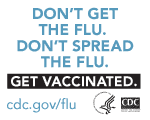Take 3 This Flu Season

1. Take time to get a flu vaccine.
2. Take everyday preventive actions (like washing your hands often and covering your cough).
3. Take antiviral drugs if your doctor says to.
Getting influenza (the flu) means feeling achy and feverish for a week or so, and while this is unpleasant enough, for some people the flu can be more serious, even deadly.
Each year in the United States, an average of 36,000 people die, and more than 200,000 are hospitalized from serious flu complications. And some people, such as older people, young children, pregnant women and people with certain chronic health conditions are at higher risk for serious flu complications. For instance, each year, 20,000 children under the age of 5 are hospitalized from serious flu-related complications.
CDC tracks flu activity each season in the United States and recent reports indicate flu activity is widespread in most of the country at this time. While flu activity most often peaks in February, different influenza viruses can continue to circulate as late as May. Fortunately, there are actions you can take to protect yourself and your loved ones from the flu.
Vaccinate
First, if you haven't gotten a flu vaccine yet, take time to get one now. A flu vaccine is the best way to protect against the flu, and this year there is an all-time high supply of vaccine. Because flu season can last as late as May, getting a flu vaccine now can still be beneficial. Also, the vaccine protects against three different viruses, so even if your community has been hit by one wave of flu, a vaccine may still protect you against the appearance of another flu virus. Although some providers may have run out of vaccine, others still have plenty left, so try alternate vaccine providers until you find a vaccine.
Anyone who wants to avoid getting the flu should seek out a vaccination, but people at high risk for complications from the flu and those who live with or care for those people at high risk for complications from flu are especially recommended to get a flu vaccine.

Stop Germs
Second, take everyday actions that can help stop the spread of germs that can cause respiratory illness, like the flu. This includes covering your nose and mouth with a tissue, washing your hands with soap and water often, and staying home if you are sick. Also, try to avoid touching your eyes, nose or mouth, since germs can spread this way.
Be on the look-out for flu-like symptoms, including a high fever, headache, extreme tiredness, dry cough, sore throat, runny or stuffy nose and muscle aches. If you have these symptoms, remember to stay away from others to keep from spreading illness to them.
Antiviral Drugs
And third, there are influenza antiviral drugs approved to treat and prevent the flu. For treatment, these drugs can reduce the time you are sick and lessen symptoms. They can also prevent serious complications from the flu. These drugs must be prescribed by a health care professional and should be started within 48 hours of getting sick.
If you become sick with flu-like symptoms this season, your doctor will consider the likelihood of influenza being the cause of your illness, the number of days you have been sick, side effects of the medication, etc. before making a recommendation about using antiviral drugs.
Antiviral drugs offer an important second line of defense against the flu. Two flu antiviral drugs are recommended for use in the United States during the 2007–08 flu season: oseltamivir and zanamivir.
So this flu season, take simple steps to do your part to protect yourself and others from the flu.
For More Information
Page last updated: February 25, 2008
Content source: National Center for Immunization and Respiratory Diseases
Content owner: National Center for Health Marketing
URL for this page: www.cdc.gov/Features/FluTake3/


